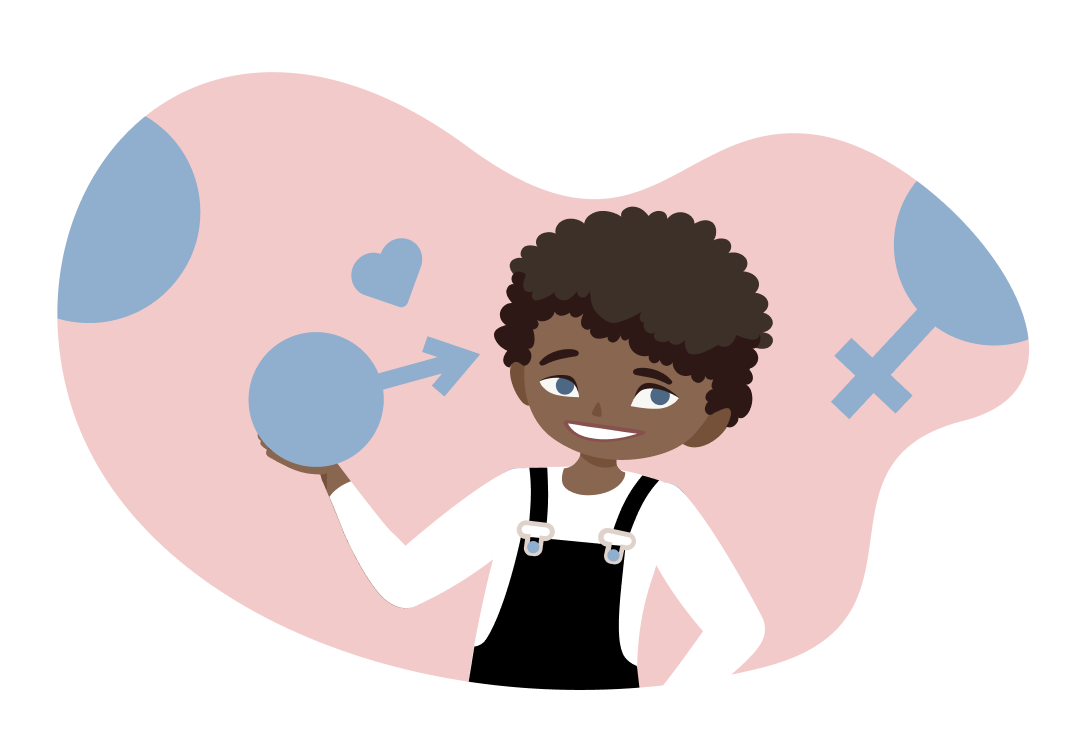
What is sex education and why is it important?
Sex education is an integral part of education in general. It would be better for you to start it from the earliest childhood. Still, you should not forget that there is a necessary minimum of information for each age. For example, it should not be too detailed and scientific to talk about anatomy and reproduction to a five-year-old child asking the question: «Where did I come from?».
In our Age-by-age sex education guide you will find more tips and ideas on when and how talk to you kids about sex.
In general, the main goal of sex education is to raise a boy to a man and a woman from a girl. It implies a set of pedagogical measures aimed at the formation in a child:
- understanding his or her gender identity;
- patterns of sexual behavior;
- personal hygiene skills;
- ideas about the physiological change characteristic of boys and girls;
- an adequate, reasonable attitude to the sexual issue.
The topic of sexual relations between a man and a woman should not be taboo and cause the child a feeling of excessive embarrassment or fear. If children have questions on this topic, they should know that they can address them to their parents and get a clear explanation. At the same time, parents need to understand that excessive openness can be harmful.
A person knows himself from birth. Freud argued that the basis of the human psyche is sexuality, which develops as you grow up. At each stage of psychosexual development, certain personality traits are formed. And how favorable this formation will depend directly on the behavior of the parents.
Stages of a child’s psychosexual development
From birth to 1.5 years
During this period, the main sensory organ is the baby’s mouth. With its help, the child satisfies the need for food and gets the first pleasant sensations through sucking, swallowing, and, a little later, biting. Thus, the first object that gives the baby pleasure is the mother’s breast. The child does not separate himself from the mother and considers the breast an extension of himself.
The mother not only satisfies the child’s need for food but also gives him a sense of security, calmness, and security. At this stage, such important personality traits as confidence, activity, determination, and independence are laid, or, on the contrary, passivity, self-doubt, the eternal need for the approval and support of others.
From 1.5 to 3-3.5 years
The child learns to control the process of defecation. At this stage, parents’ behavior in terms of teaching the baby to the pot is very important. The formation of his character depends on how correctly and delicately adults will behave in this question. Parents should not force events, force, shame the child, scold him for something that does not immediately and does not always work out. This can lead to protests in the form of constipation. Or, on the contrary, the baby may have a feeling that the love of parents depends on his success in «potty» affairs, as a result — digestive problems, diarrhea.
From 3-3.5 to 6-7 years
At this stage, the child becomes interested in his body, genitals and begins the process of sexual identification. The baby asks questions about his birth, notices the differences between boys and girls, and is attracted to a parent of the opposite sex (the Oedipus complex — in boys, the Electra complex — in girls (in Freudian theory)).
By the age of 6-7, the child identifies with the parent of their own sex. A boy wants to be like his father, and a girl wants to be like her mother. During this period, parents must be an example for their children in everything: in behavior, attitude to each other, discipline, responsibility, hygiene, and neatness. Besides, adults need to be more attentive, monitor their words and actions.
From 6-7 to 12 years
During this period, the child’s interest in the sexual issue decreases. It is much more interesting for him to be in society, to build friendly relations with peers, to expand the circle of communication, to acquire new knowledge, to develop culturally and intellectually.
From the age of 12
The child enters puberty. During this period, the formation of adult sexuality takes place. The teenager begins to experience sexual interest and attraction to the opposite sex, looks for independence in everything, gradually goes out of control of parents.
At this stage, a teenager may experience sexual attraction to peers of the same sex. According to sexologists, this is normal: teenagers are experimenting. They are entering a new, unknown stage of their life. They want to learn more about sexual relationships, get their own experience. They often choose people of the same sex as their partners because they are more accessible. It is easier to establish contact and close relationships with them. Most often, teenage homosexuality is a temporary, transitional phenomenon. Also, the homosexuality of a teenager may not be true, but demonstrative, arising, for example, in response to a too harsh upbringing in the family.

At each stage of psychosexual development, a person’s personality is formed. Hence, the help and support of parents are necessary for the child throughout this difficult path. This is the task of sex education.
The most important thing in the sexual education of children is a trusting relationship with adults. The sooner they are established and the stronger they are, the easier it is for both parents and the child. If a child knows from an early age that he or she can honestly and frankly talk to his parents on absolutely any topic, then it is much more likely that he/ she will tell them about his/ her problems, doubts, and worries.
Parents’ task is to give their children the confidence that they will always be heard and understood. If you manage to achieve such a relationship with a small child, it is likely that in adolescence, with his/ her no longer childish problems, he or she will come to you. That’s why early sex education is so important.
Sex education of preschoolers
The sex education of preschoolers should begin with instilling in them elementary skills of personal hygiene. It is necessary to teach the child to cleanliness and neatness, make sure that he or she goes to the toilet in time and has clean loose underwear that does not irritate the genitals, prevent or treat worm diseases on time.

Have two years, children begins to recognize their gender, explore their body. In the process of understanding ourselves and the world, it sets uncomfortable questions for adults (where they came from, what differs boys from girls, etc.). Often adults who are not ready for such conversations are lost, don’t know what to answer. This behavior only fuels the child’s interest, creating an artificial excitement around the topic. Without getting answers from parents, the child will try to find them from more experienced peers or the Internet.
An important component of sex education is the topic of sexual safety. It is the parents who should:
- instill in children respect for their own body;
- explain to them that no outsiders (except doctors and, up to a certain age, the parents themselves) have the right to touch them in intimate places;
- teach them to say «no».
Sex education for adolescents
When a child enters puberty, he or she has hormonal changes. Questions of the relationship between the sexes are interested in teenagers no longer out of idle curiosity but because they are already beginning to experience sexual attraction to some extent. Parents need to talk to their children. They should receive information from a parent of the same sex to avoid embarrassment, which will prevent them from perceiving what they are trying to convey.
What do you need to explain to a teenager?
- the physiological structure of your body, to understand and accept its natural changes;
- personal hygiene rules;
- what is sex;
- what is a sexual orientation;
- risk of sexually transmitted diseases;
- methods of contraception;
- that there is sexual violence, and how to resist it.
The main thing is for a teenager to realize that sex and everything related to it is a big responsibility.
Sex education of girls
It is the prerogative of mothers to have confidential conversations with girls. A mother’s task is to establish communication with her daughter so that she does not hesitate to address her with questions that concern her and talk about her problems, hobbies, and loves.

It is necessary to bring up in the girl such traits as neatness, responsibility for their actions, a serious attitude to the choice of a life partner. The mother should tell her daughter about the dangers of promiscuous sexual life and its consequences. A mother should build a relationship with her daughter based not on fear, but trust and respect, so that in the event of unwanted pregnancy, the daughter is not afraid to tell her parents about it and ask for their help.
What should I tell my daughter as part of sex education?
- What menstruation is, why and when it begins, and what is needed (given the female body’s physiology, a girl should know this by the age of 10).
- That there is a female gynecologist, what problems he solves and how often you need to go to see him.
- What is sex, and that it is necessary to engage in it for love, and not out of compulsion or out of a desire to become an adult as soon as possible.
- What masturbation is.
- What the means of contraception are.
- That there are sexually transmitted diseases (even fatal ones).
- That the result of unprotected sex can be an early, unwanted pregnancy.
- What abortion is, and how early abortion can affect later life.
Sex education of boys
Ideally, the father or some authoritative man in the family should be engaged in the sexual education of a boy from 6-7 years old.

A father should be able to win over his son to talk about frank topics. In a boy, it is necessary to develop responsibility, the ability to make decisions, and a respectful attitude towards a woman. And it is best to demonstrate all these qualities by personal example.
What should I tell my son as part of sex education?
- About the physiological changes inherent in all men (the appearance of hair on the body, breaking of the voice, emissions, morning erection), explain that this is not scary and even more so not a shame.
- About sex, methods of contraception.
- About masturbation.
- About sexually transmitted diseases.
- About the responsibility for your life and the life of your sexual partner.
- About unwanted pregnancy.
Sex education models
Let’s talk separately about the models of sex education.
The permissive (liberal) model of sex education is adopted, for example, in Denmark. Sexuality is understood as an important life value. The only mandatory and cultivated norm is a sense of responsibility for the nature and consequences of sexual relations shared with others. It is the moral duty of all to bear responsibility for the birth of unwanted children. Therefore birth planning and the use of contraceptives are promoted, while artificial abortion is morally condemned.
The restrictive (repressive) sex education is carried out in most catholic countries, particularly in Italy. It is aimed at understanding the concepts of masculinity and femininity, family roles, including paternal and maternal ones. Information about reproductive processes and functions is presented very gradually and carefully. Much attention is paid to the formation of the ability to control and suppress sexual needs in the name of higher values. Chastity in the broad sense and premarital chastity are the most important aspects of sexuality: a person must realize their sexuality responsibly.
The «golden mean» strategy and tactics determine sex education in several countries in Europe, including Poland. It is designed to help avoid frustration and harm to others in sexual relations in general and in family, to facilitate personal and psychosexual development, to soften the transition to adulthood, so that the realization of emotional and sexual needs does not violate basic social norms and the well-being of other people.
The more freedom is given to members of society, the more mature and responsible they should be. Acceptable sexual activity is determined by age and the mutual physical, mental, and sociomoral maturity and needs. Early sexual relationships are bad and unacceptable insofar as they may violate the interests or well-being of the parents and the child born in an immature relationship. The fidelity of partners to each other ceases to be identified with sexual exclusivity, which is considered mandatory for marriage but does not exclude a broader and liberal understanding.
The acceptance of these existing models in society is regulated by the individual attitude to sexuality and sex education; there is always a gap between a particular model’s attitudes and real education.
Sex education in the United States
Let’s take a closer look at sex education in America. Sex education in the United States is taught in two main forms: comprehensive sex education and abstinence-only.
Comprehensive sex education is also called abstinence-based sex education, abstinence-plus, abstinence-plus risk reduction, and sexual risk reduction. This approach embraces abstinence as an option and informs adolescents about human sexuality, the age of consent, and the availability of contraceptives and methods to avoid contracting sexually transmitted infections.
Abstinence-only sex education is also referred to as abstinence-oriented sex education, abstinence-only pre-marriage education, sexual risk prevention, and, more recently, sex education aimed at youth empowerment. This approach emphasizes abstinence from sexual activity before marriage and rejects methods such as contraception.
The two approaches are very different in their philosophies and strategies for educating young people about their sexuality. The difference between the two approaches and their impact on adolescent behavior remains a contentious issue in the United States.
Sex education programs appeared in the United States already in the 40s. Still, only in the late 60s, about 30 years ago, classes on these programs began to be held in public schools in the country (they covered about 2% of students). Currently, 93% of all public schools in America are covered by programs that address issues of sexual behavior, sexual orientation, and the prevention of sexually transmitted diseases (primarily AIDS). In the mid-80s, three-quarters of all parents supported the idea of conducting classes in these programs in the upper secondary school, and more than half — in grades 4 to 8.

However, American society’s attitude to the problem of sexual education is not as unanimous as it may seem from the figures given. In this regard, a real confrontation has arisen in society, which periodically weakens, and then increases again. For example, when Americans first realized the seriousness of the threat posed by the spread of AIDS (the mid-80s), a significant number of parents agreed that the use of contraceptives should be told to 12-year-olds. Still, now most do not seem to support such extremes.
Besides, in the United States, the effectiveness of sex education programs was quite low. Several hundred Americans are still infected with AIDS in high schools (in 1994, 417 cases were reported in the 13-19 age group, and probably many young people and the older age group — 20-24 years — were infected during school-age). The relative number of pregnancies among teenagers in the United States is twice as high as in schools in developed European countries. According to the Americans themselves, the programs of sexual education of young people in the UK, France, Canada, and the Scandinavian countries were much more successful than in the United States.
Given the fact that deviations from sexual norms are observed in children and adolescents more and more often, the problem of sex education becomes relevant at all age stages of children’s development. Information in this matter is the only way to protect the younger generation from fatal mistakes that can have serious consequences. Therefore, it is necessary to carry out work on sexual education from early childhood and do it purposefully and systematically.

new engaging articles



